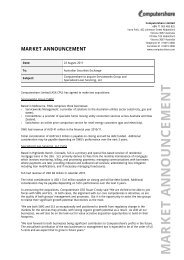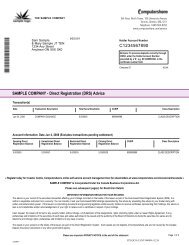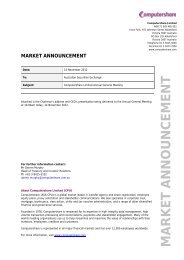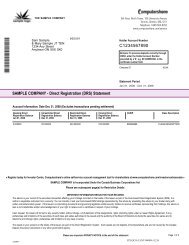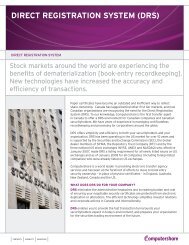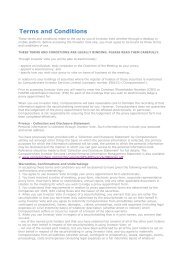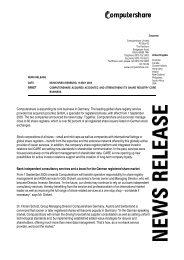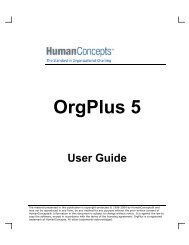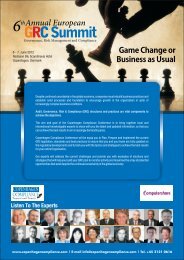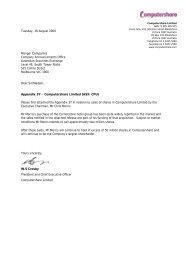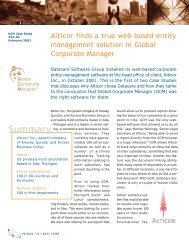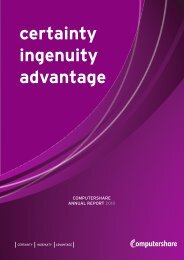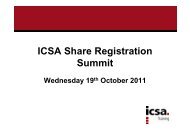COMPUTERSHARE ANNUAL REPORT 2008
COMPUTERSHARE ANNUAL REPORT 2008
COMPUTERSHARE ANNUAL REPORT 2008
Create successful ePaper yourself
Turn your PDF publications into a flip-book with our unique Google optimized e-Paper software.
Notes to the Financial StatementsRevised AASB 101 Presentation of Financial Statements and AASB 2007-8 Amendments to Australian Accounting Standards arisingfrom AASB 101The revised AASB 101 that was issued in September 2007 is applicable for annual reporting periods beginning on or after1 January 2009. It requires the presentation of a statement of comprehensive income and makes changes to the statement ofchanges in equity but will not affect any of the amounts recognised in the financial statements. If an entity has made a prior periodadjustment or a reclassification of items in the financial statements, it will also need to disclose a third balance sheet (statement offinancial position), this one being as at the beginning of the comparative period.AASB <strong>2008</strong>-1 Amendments to Australian Accounting Standard - Share-based Payments: Vesting Conditions and CancellationsAASB <strong>2008</strong>-1 was issued in February <strong>2008</strong> and will become applicable for annual reporting periods beginning on or after1 January 2009. The revised standard clarifies that vesting conditions are service conditions and performance conditions only andthat other features of a share-based payment are not vesting conditions. It also specifies that all cancellations, whether by the entityor by other parties, should receive the same accounting treatment. The Group will apply the revised standard from1 July 2009, but it is not expected to affect the accounting for the Group’s share-based payments.Revised AASB 3 Business Combinations, AASB 127 Consolidated and Separate Financial Statements and AASB <strong>2008</strong>-3 Amendmentsto Australian Accounting Standards arising from AASB 3 and AASB 127Revised accounting standards for business combinations and consolidated financial statements were issued in March <strong>2008</strong> and areoperative for annual reporting periods beginning on or after 1 July 2009, but may be applied earlier. The Group has not yet decidedwhen it will apply the revised standards. However, the new rules generally apply only prospectively to transactions that occurafter the application date of the standard. Their impact will therefore depend on whether the Group will enter into any businesscombinations or other transactions that affect the level of ownership held in the controlled entities in the year of initial application.AASB <strong>2008</strong>-7 Amendments to Australian Accounting Standards - Cost of an Investment in a Subsidiary,Jointly Controlled Entity or AssociateIn July <strong>2008</strong> the AASB approved amendments to AASB 1 First-time Adoption of International Financial Reporting Standards andAABS 127 Consolidated and Separate Financial Statements. The new rules will apply to financial reporting periods commencingon or after 1 January 2009. The Group will apply the revised rules prospectively from 1 July 2009. After that date, all dividendsreceived from investments in subsidiaries, jointly controlled entities or associates will be recognised as revenue, even if they arepaid out of pre-acquisition profits, but the investments may need to be tested for impairment as a result of the dividend payment.Furthermore, when a new intermediate parent entity is created in internal reorganisations it will measure its investment insubsidiaries at the carrying amounts of the net assets of the subsidiary rather than the subsidiary’s fair value.Improvements to Australian Accounting Standards: AASB <strong>2008</strong>-5 and AASB <strong>2008</strong>-6In July <strong>2008</strong>, the AASB issued a number of improvements to existing Australian Accounting Standards Standards. The amendmentswill generally apply to financial reporting periods commencing on or after 1 January 2009, except for some changes to AASB 5Non-current Assets Held for Sale and Discontinued Operations regarding the sale of the controlling interest in a subsidiary whichwill apply from 1 July 2009. The Group will apply the revised standards from 1 July 2009. The Group does not expect that anyadjustments will be necessary as the result of applying the revised rules.IFRIC Interpretation 16 Hedges of a Net Investment in a Foreign OperationIFRIC Interpretation 16 was issued in July <strong>2008</strong> and applies to reporting periods commencing on or after 1 October <strong>2008</strong>. Theinterpretation clarifies which foreign currency risks qualify as hedged risk in the hedge of a net investment in a foreign operationand that hedging instruments may be held by any entity or entities within the group. It also provides guidance on how an entityshould determine the amounts to be reclassified from equity to profit or loss for both the hedging instrument and the hedged item.The Group will apply the interpretation prospectively from 1 July 2009. There will be no changes to the accounting for the existinghedge of the net investment.AASB <strong>2008</strong>-8 Amendment to Australian Accounting Standards - Eligible Hedged ItemIn August <strong>2008</strong> the AASB approved an amendment to AASB 139 Financial Instruments: Recognition and Measurement. It iseffective for accounting periods beginning on or after 1 July 2009 and must be applied retrospectively in accordance withAASB 108 Accounting Policies, Changes in Accounting Estimates and Errors. The Group will apply the amended standard from1 July 2009 and has reviewed its hedging transactions and determined that there will be no impact on the financial report when thestandard is first applied.PAGE 48 Computershare Annual Report <strong>2008</strong>



